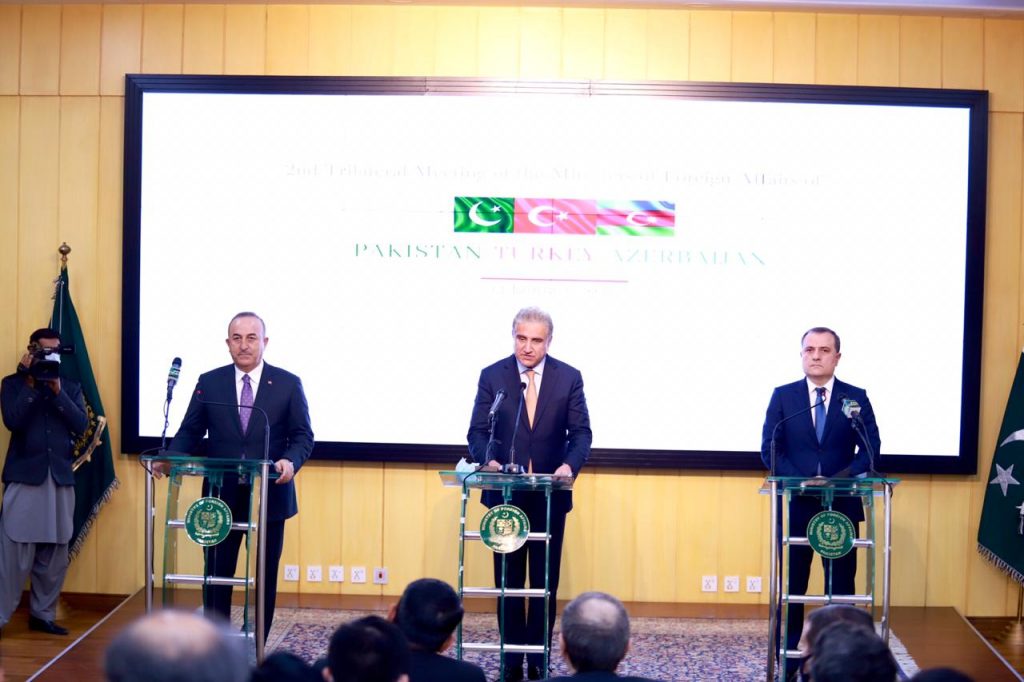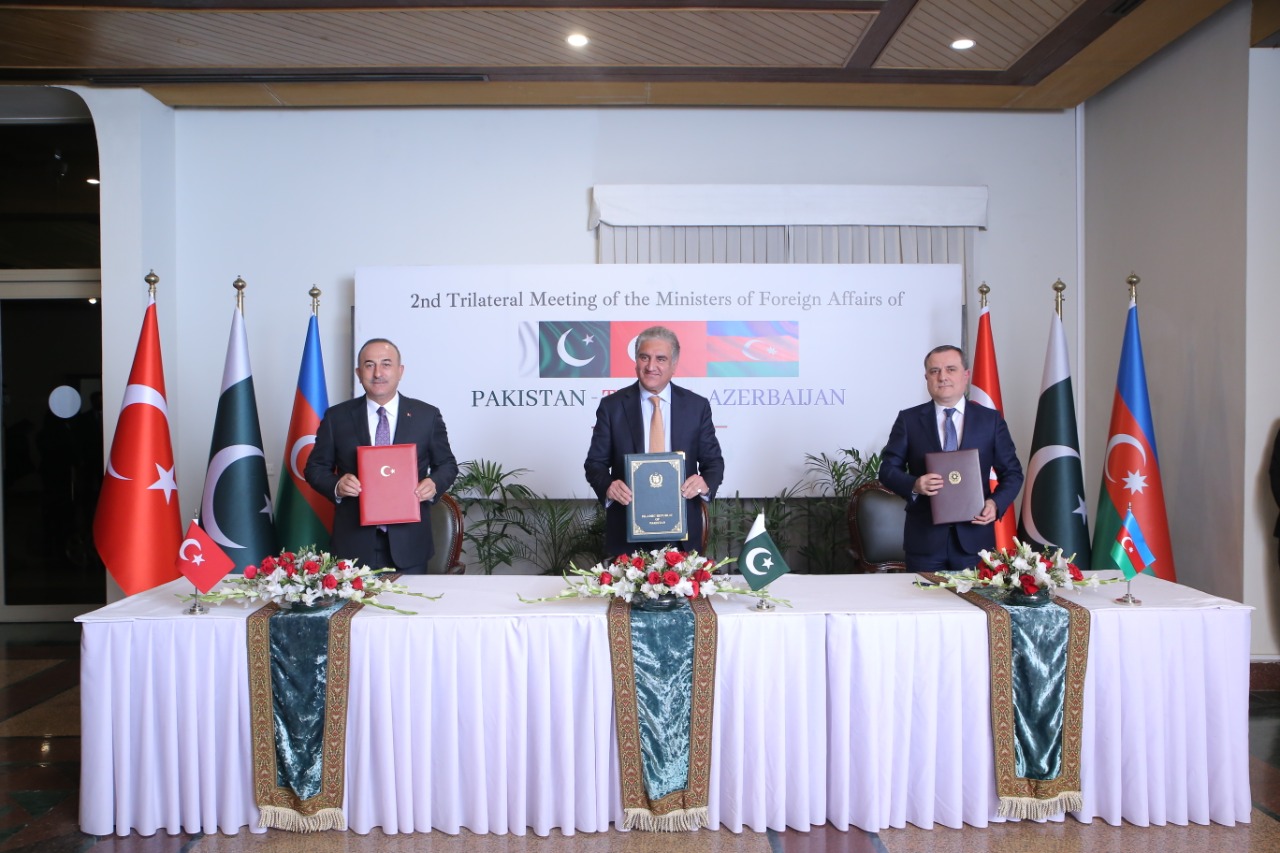

By Raja kamran
The 2nd Trilateral Meeting of the Ministers of Foreign Affairs of the Republic of Azerbaijan, the Islamic Republic of Pakistan and the Republic of Turkey was held in Islamabad today.
The meeting concluded with the signing of Islamabad Declaration by the three Foreign Ministers. The text of the Declaration is as follows:
At the invitation of Makhdoom Shah Mahmood Qureshi, the Minister for Foreign Affairs of the Islamic Republic of Pakistan, and with the participation of H.E. Mr. Mevlut Cavusoglu, the Minister of Foreign Affairs of the Republic of Turkey and H.E. Mr. Jeyhun Bayramov, the Minister of Foreign Affairs of the Republic of Azerbaijan, the Second round of Trilateral Dialogue of the Ministers of Foreign Affairs of the three countries was held in Islamabad.
Emphasizing the existing cordial ties among the three countries, based on fraternity, historic and cultural bonds, mutual respect and trust;
Desirous of deepening further cooperation built on outcome of the first Trilateral Meeting held in Baku on 30 November 2017, in all areas of mutual interest, including political, strategic, trade, economic, peace and security, science and technology and cultural fields;
Mindful of the significant contributions made by Pakistan, Turkey and Azerbaijan for promotion of peace, stability and development in their respective regions and the mutual desire of their peoples to further advance these ideals for shared prosperity and security in the broader region;
Conscious of the myriad challenges and emerging threats confronting their countries including but not limited to threats of foreign sponsored acts of terrorism, cyber-attacks, hybrid forms of warfare, targeted disinformation campaigns, and escalating trends of Islamophobia affecting the peaceful co-existence of Muslim communities in many countries;
Expressing serious concerns on the grave human rights violations and crimes against humanity committed against the Muslim communities in various parts of the world;
Fully aware of the far-reaching implications of the COVID 19 pandemic as well as the vulnerability of the respective regions to adverse impacts of climate change;
Expressing solidarity with the government and people of Azerbaijan in their efforts to rebuild and rehabilitate liberated territories;
And reaffirming commitment towards developing regional consensus for peace and development;
Reiterated their strong and unequivocal support for safeguarding and defending the sovereignty, territorial integrity and inviolability of international borders of their respective States;
Agreed to enhance joint efforts on combating Islamophobia, discrimination and persecution of Muslim minorities, in particular at the regional and international fora;
Recognized the contribution of the Heart of Asia-Istanbul Process in peace, stability and economic prosperity in Afghanistan and in the region, and appreciated the efforts of the Government of Pakistan in facilitating a political solution to the issues in the region, expressed their support to Afghan-led, Afghan-owned peace process;
Renewed their resolve to strengthen cooperation in peace and security in line with various international and regional instruments to combat all forms and manifestations of terrorism, transnational organized crime, trafficking of drugs, narcotics, trafficking in persons, money laundering, crimes against cultural and historical heritage and cybercrimes;
Reaffirmed the most recent OIC resolution 10/47-Pol on the Jammu and Kashmir dispute adopted in Niamey in November 2020 and Communiqués of OIC Contact Group on Jammu and Kashmir and expressed deep concern over the unilateral actions of 5 August 2019, continuing grave human rights violations in and efforts to change the demographic structure of Jammu and Kashmir, and reiterated their principled position for a peaceful settlement of the Jammu and Kashmir dispute in accordance with the relevant UN Security Council Resolutions;
Resolved to support a just, sustainable and realistic and mutually accepted settlement of the Cyprus issue, as well as the issues in the Aegean and the Eastern Mediterranean on the basis of international law;
Reiterated their support for putting an end to the Armenia-Azerbaijan conflict and normalization of relations on the basis of sovereignty and territorial integrity and internationally recognized borders of Azerbaijan in accordance with the relevant UN Security Council resolutions;
Committed to promote cooperation in defence and security fields, including through sharing best practices, capacity building, new and emerging technologies and regular exchange of visits;
Discussed the far-reaching implications for economic growth and public health due to COVID 19 pandemic, agreed to exchange information, research, expertise and best practices, and called for enhanced international cooperation and solidarity to effectively and comprehensibly addressing the challenge, keeping in view financial and capacity limitations of developing countries;
Decided to intensify and deepen cooperation for enhancing trilateral trade &investment and encouraged the relevant ministries of the three countries to develop a robust Action Plan with concrete recommendations regarding easing of duties, tariff and non-tariff barriers, transportation costs, better coordination among the banking sectors and protection of mutual investments, for consideration and approval by the leadership;
Determined to enhance cooperation on regional connectivity in transport, trade, energy, people-to-people contacts, education, social and cultural exchange, tourism, and ICT, including through improving and strengthening air, rail and road links and regional connectivity initiatives at various regional fora;
Underlined the need to intensify cooperation for food and energy security, environment, sustainable development and climate change and called for greater international cooperation for timely response and achievement of the 2030 Sustainable Development Goals.
Unquote